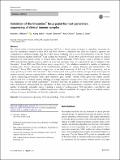Files in this item
Validation of the Oncomine™ Focus Panel for Next Generation Sequencing of clinical tumour samples
Item metadata
| dc.contributor.author | Williams, Hannah L. | |
| dc.contributor.author | Walsh, Kathy | |
| dc.contributor.author | Diamond, Austin | |
| dc.contributor.author | Oniscu, Anca | |
| dc.contributor.author | Deans, Zandra C. | |
| dc.date.accessioned | 2018-08-13T09:30:08Z | |
| dc.date.available | 2018-08-13T09:30:08Z | |
| dc.date.issued | 2018-08-13 | |
| dc.identifier | 254608713 | |
| dc.identifier | b26c8382-722c-432a-89a1-ed6260e6c01a | |
| dc.identifier | 85051872040 | |
| dc.identifier | 000446380500011 | |
| dc.identifier.citation | Williams , H L , Walsh , K , Diamond , A , Oniscu , A & Deans , Z C 2018 , ' Validation of the Oncomine™ Focus Panel for Next Generation Sequencing of clinical tumour samples ' , Virchows Archiv , vol. First Online . https://doi.org/10.1007/s00428-018-2411-4 | en |
| dc.identifier.issn | 0945-6317 | |
| dc.identifier.uri | https://hdl.handle.net/10023/15810 | |
| dc.description.abstract | The clinical utility of next-generation sequencing (NGS) for a diverse range of targets is expanding, increasing the need for multiplexed analysis of both DNA and RNA. However, translation into daily use requires a rigorous and comprehensive validation strategy. The aim of this clinical validation was to assess the performance of the Ion Torrent Personal Genome Machine (IonPGM™) and validate the Oncomine™ Focus DNA and RNA Fusion panels for clinical application in solid tumour testing of formalin-fixed, paraffin-embedded (FFPE) tissue. Using a mixture of routine FFPE and reference material across a variety of tissue and specimen types, we sequenced 86 and 31 samples on the Oncomine™ Focus DNA and RNA Fusion assays, respectively. This validation considered a number of parameters including the clinical robustness of the bioinformatics pipeline for variant detection and interpretation. The Oncomine™ Focus DNA assay had a sample and variant-based sensitivity of 99.1 and 97.1%, respectively, and an assay specificity of 100%. The Oncomine™ Focus Fusion panel had a good sensitivity and specificity based upon the samples assessed, however requires further validation to confirm findings due to limited sample numbers. We observed a good sequencing performance based upon amplicon, gene (hotspot variants within gene) and sample specific analysis with 92% of clinical samples obtaining an average amplicon coverage above 500X. Detection of some indels was challenging for the routine IonReporter™ workflow; however, the addition of NextGENe® software improved indel identification demonstrating the importance of both bench and bioinformatic validation. With an increasing number of clinically actionable targets requiring a variety of methodologies, NGS provides a cost-effective and time-saving methodology to assess multiple targets across different modalities. We suggest the use of multiple analysis software to ensure identification of clinically applicable variants. | |
| dc.format.extent | 15 | |
| dc.format.extent | 1589934 | |
| dc.language.iso | eng | |
| dc.relation.ispartof | Virchows Archiv | en |
| dc.subject | Next-generation sequencing | en |
| dc.subject | Molecular pathology | en |
| dc.subject | Clinical validation | en |
| dc.subject | FFPE | en |
| dc.subject | RB Pathology | en |
| dc.subject | RC0254 Neoplasms. Tumors. Oncology (including Cancer) | en |
| dc.subject | T Technology | en |
| dc.subject | DAS | en |
| dc.subject | SDG 3 - Good Health and Well-being | en |
| dc.subject.lcc | RB | en |
| dc.subject.lcc | RC0254 | en |
| dc.subject.lcc | T | en |
| dc.title | Validation of the Oncomine™ Focus Panel for Next Generation Sequencing of clinical tumour samples | en |
| dc.type | Journal article | en |
| dc.contributor.institution | University of St Andrews. School of Medicine | en |
| dc.identifier.doi | https://doi.org/10.1007/s00428-018-2411-4 | |
| dc.description.status | Peer reviewed | en |
This item appears in the following Collection(s)
Items in the St Andrews Research Repository are protected by copyright, with all rights reserved, unless otherwise indicated.

